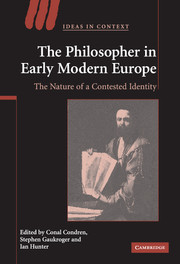Book contents
- Frontmatter
- Contents
- List of contributors
- Acknowledgements
- Introduction
- 1 The persona of the natural philosopher
- 2 The university philosopher in early modern Germany
- 3 The persona of the philosopher and the rhetorics of office in early modern England
- 4 From Sir Thomas More to Robert Burton: the laughing philosopher in the early modern period
- 5 Hobbes, the universities and the history of philosophy
- 6 The judicial persona in historical context: the case of Matthew Hale
- 7 Persona and office: Althusius on the formation of magistrates and councillors
- 8 Descartes as sage: spiritual askesis in Cartesian philosophy
- 9 The natural philosopher and the virtues
- 10 Fictions of a feminine philosophical persona: Christine de Pizan, Margaret Cavendish and philosophia lost
- 11 John Locke and polite philosophy
- Index
- IDEAS IN CONTEXT
7 - Persona and office: Althusius on the formation of magistrates and councillors
Published online by Cambridge University Press: 06 November 2009
- Frontmatter
- Contents
- List of contributors
- Acknowledgements
- Introduction
- 1 The persona of the natural philosopher
- 2 The university philosopher in early modern Germany
- 3 The persona of the philosopher and the rhetorics of office in early modern England
- 4 From Sir Thomas More to Robert Burton: the laughing philosopher in the early modern period
- 5 Hobbes, the universities and the history of philosophy
- 6 The judicial persona in historical context: the case of Matthew Hale
- 7 Persona and office: Althusius on the formation of magistrates and councillors
- 8 Descartes as sage: spiritual askesis in Cartesian philosophy
- 9 The natural philosopher and the virtues
- 10 Fictions of a feminine philosophical persona: Christine de Pizan, Margaret Cavendish and philosophia lost
- 11 John Locke and polite philosophy
- Index
- IDEAS IN CONTEXT
Summary
In recent years, the quest to identify the early modern ‘ego’ has led us to question the retrojection of modern conceptions of the ‘autonomous’ self into the past. In early modernity the idea of owning or having ‘dominium’ over oneself floated on the surface of a layer of fundamental duties, so qualifying the very notion of natural rights. Obligations to a common moral good specified in divine and natural law weighed much heavier than concerns about the autonomy of the individual, even in such writers as Locke or Grotius, once acclaimed as champions of individual liberty. The sphere of the self may need to be understood in more restricted terms: for example, through the search for signs of divine grace in the epistolary exchanges of seventeenth-and eighteenth-century Protestant divines. Studies of the persona of eighteenth-century clergy have been particularly interesting in terms of the gradual elaboration of a sphere of introspection that took as its template something that increasingly resembled the autonomous self. As the protection of such an alleged autonomous personality became a token of the civilised state, ‘society was denied the right to subordinate a natural entelechy to a social objective’, and the ‘self’ began its career.
These later developments are, of course, only relevant for our present purpose to the degree they help to distinguish Althusius's altogether different set of assumptions regarding duties, rights and their bearers.
- Type
- Chapter
- Information
- The Philosopher in Early Modern EuropeThe Nature of a Contested Identity, pp. 160 - 181Publisher: Cambridge University PressPrint publication year: 2006



